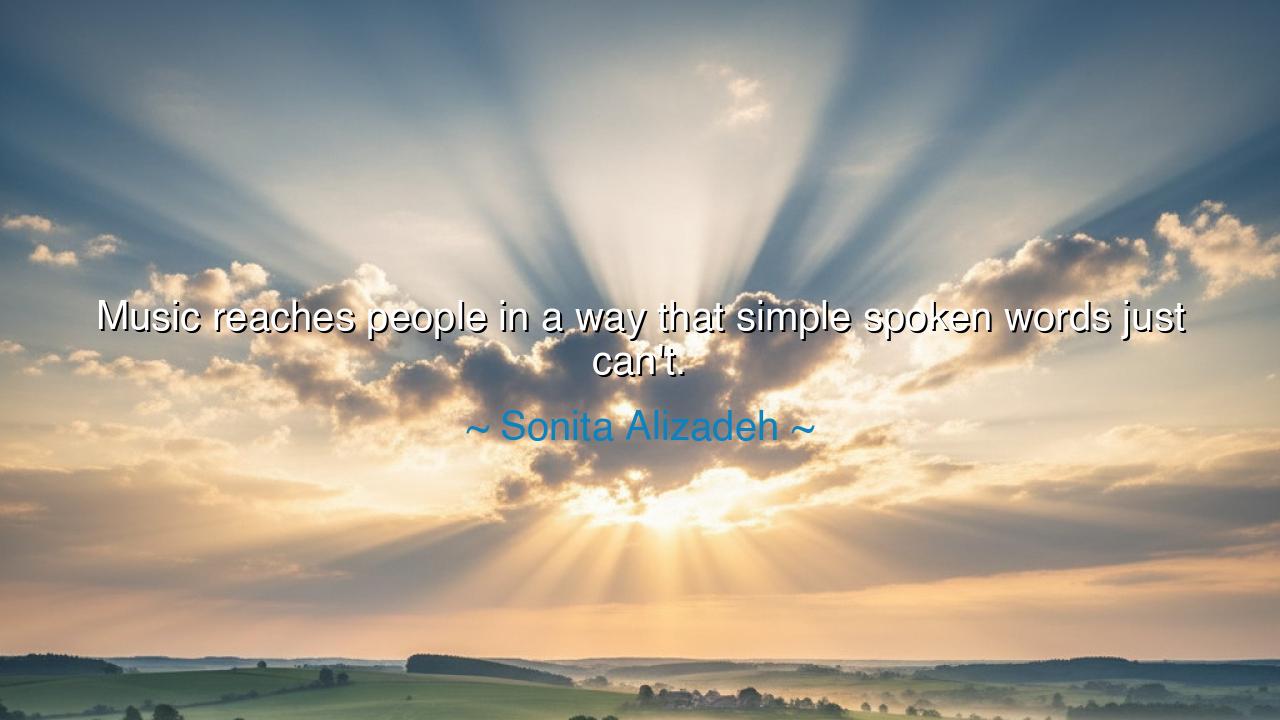
Music reaches people in a way that simple spoken words just






Hear the words of Sonita Alizadeh, who declared: “Music reaches people in a way that simple spoken words just can’t.” In this truth lies the eternal mystery of music, the power it holds to move the heart more deeply than reason, to stir the soul more fiercely than argument. For words alone may inform, but music transforms. Words may be heard with the mind, but music is felt in the blood, in the marrow, in the secret chambers of the spirit.
The ancients knew this well. They told of Orpheus, whose lyre could tame wild beasts and soften the hearts of kings. His words alone would not have saved him, but when he bound them with melody, they became irresistible, irresistible even to the underworld itself. Thus Sonita speaks from the same eternal spring: that music carries a force beyond the tongue, a flame that leaps directly into the heart, unbarred by walls of intellect or defense.
Consider the life of Bob Dylan, whose songs became the voice of protest in the 1960s. His poetry, if spoken plainly, may have been dismissed as complaint or rhetoric. But clothed in music, his words became anthems, burning into the minds of millions, fueling marches and movements, echoing across generations. The melody made the message immortal. This is the power Sonita speaks of—the power to reach people not just as listeners, but as participants in a shared fire of feeling.
For Sonita herself knows this truth by experience. Born in Afghanistan, where her voice as a woman might have been silenced by custom and power, she turned to rap music as her weapon. Through rhythm and rhyme, she told of the pain of forced marriage, of the hunger for freedom, of the dignity of women. Spoken plainly, such truths might have been ignored or dismissed. But in the form of song, they spread across the world, awakening compassion and rallying strength. Her story proves the truth of her words: music enters where speech alone cannot.
The lesson here is profound: if you wish to move hearts, do not rely only on reason. Seek the power of expression that stirs feeling. For humans are not creatures of thought alone; they are creatures of rhythm, of heartbeat, of pulse. When you speak through music, you speak the very language of the body and soul. This is why mothers sing to their children, why soldiers march to drums, why temples echo with chants—it is music that binds, heals, and inspires.
To you who hear this, take it as sacred counsel. Do not underestimate the power of song in your own life. Let music become your companion in sorrow, your shield in struggle, your trumpet in battle. If you have a message to share, find a way to clothe it in rhythm and melody, for in that form it will travel farther, burn brighter, and endure longer. And even if you do not create music, let yourself be open to it, for it will remind you of truths too deep for words.
Practical wisdom follows: surround yourself with songs that elevate your spirit. Use music not only for entertainment but for strength, for healing, for connection. If you are a teacher, let music carry your lessons. If you are an activist, let music be your cry. If you are simply a soul on the journey of life, let music remind you that you are not alone. For where words falter, music reaches, and where the tongue is bound, the song is free.
Thus remember Sonita Alizadeh’s truth: music reaches people in a way that words cannot. Let your life be a song, let your message find melody, and let your heart be open to the harmonies that carry us beyond speech. For in music lies the bridge between souls, the power to awaken, and the promise to endure.






AAdministratorAdministrator
Welcome, honored guests. Please leave a comment, we will respond soon